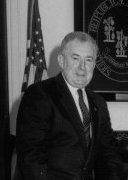In Tashjian v. Republican Party of Connecticut, 479 U.S. 208 (1986), the Supreme Court addressed the freedom of political parties to associate with independent voters by deciding that states cannot impose a closed primary system because it denies the political party its right under the First and Fourteenth Amendments to enter into political association with individuals of its own choosing.
Republican Party sued Connecticut for its closed primaries
Connecticut General Statute Section 9-431, enacted in 1955, mandated closed primary elections, limiting participation in party primaries only to registered members. In 1984 the Republican Party of Connecticut adopted a rule allowing unaffiliated, or “independent,” registered voters to participate in Republican primaries for federal and statewide offices (but not the state legislature). Pursuant to Section 9-431, however, the rule could not go into effect. The party brought an action in federal district court seeking declaratory and injunctive relief from the statute.
The party claimed that Section 9-431 violated its freedom of political association protected by the First Amendment and the due process clause. The state countered that Section 9-431 served four compelling interests:
- (1) ensuring the administrability of primary elections;
- (2) preventing party raiding;
- (3) avoiding voter confusion;
- and (4) protecting the integrity of the party system.
Further, the state argued that the party rule violated the qualifications clause (relative to members of Congress) and the Seventeenth Amendment (providing for direct election of U.S. senators). The lower federal courts found that the state’s interests were not compelling and ruled in favor of the party. The Supreme Court affirmed.
Court said states could not have a closed primary
Writing for the majority, Justice Thurgood Marshall reasoned that the party raiding and party integrity interests were not implicated in this instance because party raiding was just as likely under Section 9-431 as without it and because of the incoherence of an argument that a party must be protected from undermining its own interests. The Court also concluded that the administrability and voter confusion concerns were not substantial enough to impinge on a political party’s freedom of association. Moreover, the Court dispelled the state’s qualifications clause argument, determining that the party rule met with the clause’s overriding purpose to expand the franchise.
Justice John Paul Stevens dissented, agreeing with the state’s qualifications clause argument. Justice Antonin Scalia also dissented, arguing that the state did not violate the party’s First and Fourteenth Amendment rights because Section 9-431 did not significantly impede the party’s efforts to appeal to independent voters and because the Court had previously upheld similar statutes.
In Tashjian, state sought to exclude voters; party sought to include voters
Tashjian is part of a line of cases dealing with a political party’s freedom to associate with or disassociate from voters. Most of these cases have either seen both the party and the state seeking to exclude a subset of voters or the party seeking to exclude a group of voters while the state demands them to be included.
Tashjian is unique because it was the first Supreme Court political association case in which a party sought to include a group of voters while a state sought to exclude them. Some have argued that Tashjian represents a significant expansion of political parties’ associational freedoms because of the Court’s deference to a party organization in opposition to state law.
This article was originally published in 2009. Monica C. Bell is an Associate Professor of Law and Sociology at Yale Law School. Her research focuses on law and inequality, policing and the criminal legal system, welfare and public benefits law, housing law and residential segregation, and race and the law. She also teaches first-year Constitutional Law.

